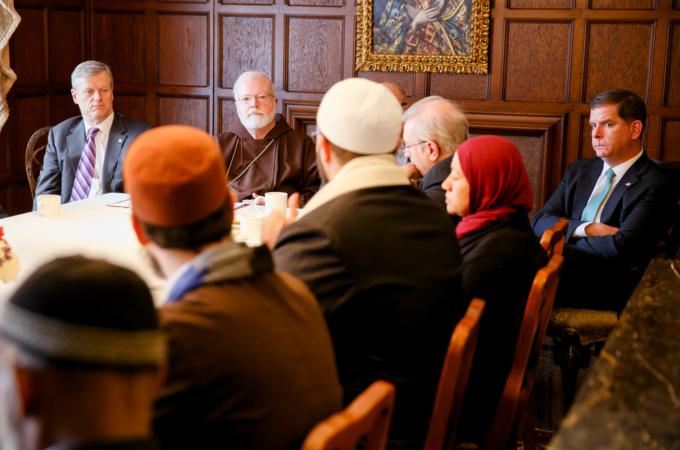Cardinal hosts gathering of local Muslim leaders, government officials
SOUTH END -- Representatives from the Archdiocese of Boston gathered with Muslim leaders and public officials Feb. 2 for an impromptu meeting to convey support and solidarity, especially in light of the recent executive order that restricts immigration into the country.
Held in the rectory of the Cathedral of the Holy Cross, attendees included Cardinal Seán P. O'Malley, Gov. Charlie Baker, Mayor Marty Walsh, Boston Police Commissioner William Evans, Greek Orthodox Metropolitan Methodios, and Director of the Islamic Council of New England Nabeel Khudairi. A number of Catholic, Greek Orthodox, Muslim representatives and faith leaders were also present.
The meeting was held just days after President Donald J. Trump signed an executive order, Jan. 27, that bans all refugees from resettling in the U.S. for four months, and all Syrian refugees from resettling in the country indefinitely. The order also blocks immigrants from seven predominantly Muslim countries from coming into the U.S. for three months.
"We come here today to express our commitment to solidarity," said Cardinal O'Malley, speaking to the Muslim leaders.
"It is just very important that our people see us sit down at the table as friends," he said.
The executive order was heavily discussed during the meeting, with many voicing concerns about what they see as a growing climate of anti-immigrant, and particularly anti-Muslim, sentiment.
"The Church is very much involved in the life of immigrants," said Cardinal O'Malley, urging that a "just and efficient immigration system that respects human rights of all people" need to be put in place.
Speaking to the group, both Gov. Baker and Mayor Walsh defended the rights of Muslims.
"This country and city were founded and based on immigrants," said Mayor Walsh, noting that over 20 percent of people living in Boston are from another country.
Speaking to the Muslim community, he said "We're here to stand with you, and beside you, and behind you if we have to. And we have to right now," he said.
Khudairi expressed gratitude for the "remarkable" responses he has seen in Boston to the executive order, including a Jan. 30 protest in the city that saw around 20,000 denounce the order.
Yet, Khudairi noted that he hopes the Muslim community will be able to "depend on our alliances," especially those with the Archdiocese of Boston, the city of Boston, and the Commonwealth, to work together in the coming months.
A statement released by the archdiocese after the meeting said "the discussion included recognition that Catholics and Muslims share a concern for the common good and together uphold our nation's founding principles of religious liberty and acceptance."
"Our country has been greatly enriched by our Muslim brothers and sisters, who contribute much to the civic, social and spiritual life of our local communities. Together we pray that our nation's proud tradition of welcome and acceptance will be strengthened as we go forward in service to our people," the statement said.




















